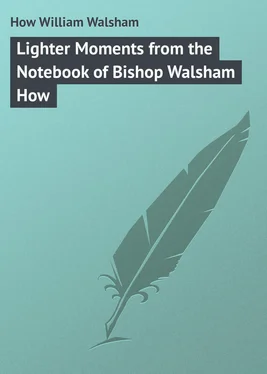William How - Lighter Moments from the Notebook of Bishop Walsham How
Здесь есть возможность читать онлайн «William How - Lighter Moments from the Notebook of Bishop Walsham How» — ознакомительный отрывок электронной книги совершенно бесплатно, а после прочтения отрывка купить полную версию. В некоторых случаях можно слушать аудио, скачать через торрент в формате fb2 и присутствует краткое содержание. Жанр: foreign_prose, foreign_humor, на английском языке. Описание произведения, (предисловие) а так же отзывы посетителей доступны на портале библиотеки ЛибКат.
- Название:Lighter Moments from the Notebook of Bishop Walsham How
- Автор:
- Жанр:
- Год:неизвестен
- ISBN:нет данных
- Рейтинг книги:4 / 5. Голосов: 1
-
Избранное:Добавить в избранное
- Отзывы:
-
Ваша оценка:
- 80
- 1
- 2
- 3
- 4
- 5
Lighter Moments from the Notebook of Bishop Walsham How: краткое содержание, описание и аннотация
Предлагаем к чтению аннотацию, описание, краткое содержание или предисловие (зависит от того, что написал сам автор книги «Lighter Moments from the Notebook of Bishop Walsham How»). Если вы не нашли необходимую информацию о книге — напишите в комментариях, мы постараемся отыскать её.
Lighter Moments from the Notebook of Bishop Walsham How — читать онлайн ознакомительный отрывок
Ниже представлен текст книги, разбитый по страницам. Система сохранения места последней прочитанной страницы, позволяет с удобством читать онлайн бесплатно книгу «Lighter Moments from the Notebook of Bishop Walsham How», без необходимости каждый раз заново искать на чём Вы остановились. Поставьте закладку, и сможете в любой момент перейти на страницу, на которой закончили чтение.
Интервал:
Закладка:
I was visiting on his death bed an old man in the village called John Richards, and one day found a very rough-looking fellow sitting by the head of his bed with his hands in his pockets, and his legs stretched out, so I asked him if he was the old man's son, to which he answered with a rough "Yes." I then asked him where he lived, and he answered in the same insolent tone, "Manchester." So, thinking he was not a pleasant specimen of Manchester manners, I took no further notice of him, but read and prayed with his father as if he were not there, he sitting in the same irreverent attitude all the time. Just as I was going he said abruptly, "I'll tell ye something." "Well," I said, "what is it?" "I had a mate once," he said, "down with the small-pox, uncommon bad, black as your hat. 'John,' he says to me, 'fetch me a minister.' So I went for one of these Chapel ministers, and I says to him, 'Come along o' me, I've got a mate bad.' So he came. So when we got to the house, before we went up, I says, 'You don't know what's the matter with him?' and he says, 'No, what is it?' 'Small-pox,' I said, 'as black as your hat.' And what do you think he did?" "I don't know," I said. "Why, run away!" he said, breaking into a loud laugh. I thought this was the end of the story, and that it was meant as a hit at all ministers, but he went on, "I warn't to be done that way, so next I goes for a Church minister, and I says to him, 'Come along o' me, I've got a mate bad.' And he came. Well, when we got to the foot of the stairs I says to him just like t'other one, 'You don't know what's the matter with him?' and he says, 'No, what is it?' So I says again, 'Small-pox as black as your hat.' Well, what do you think this chap did?" "Not run away, I hope," I answered. "No," he shouted in the most defiant way, "No, he walked straight up to the bedside and prayed with him just like you've done with my father." So I found that my rough and defiant friend was all the time paying me a compliment. But it was the most pugnacious bit of friendship I ever encountered.
No one who knew the Bishop and his wide-hearted sympathy would think for a moment that he told this story to contrast the ministers of various denominations. That was not the point. The fun lay in the man's manner. Might it not be fair to suggest that possibly the one minister had been vaccinated while the other was a "conscientious objector" arrived before his time? Here is another story of pastoral visitation:
A woman in a small Welsh farmhouse [Whittington is on the border of Wales] being taken very ill, a neighbour went for the clergyman, who said he would come directly. The neighbour going back to the farmhouse said they had better get out a Bible, as the parson might ask for one. The farmer thereupon told the woman she would find one, he thought, at the bottom of an old chest, "for thank goodness," he added, "we have had no occasion for them sort of books for many a long year – never since the old cow was so bad."
Talking of family Bibles, when Bishop Walsham How was Rector of Whittington he copied the following list from the entries in the family Bible of some people called Turner. The names are those of the twelve children of the family:
1. Turnerina de Margaret.
2. Turnerannah de Mary Elizabeth.
3. Alfred Fitz Cawley de Walker.
4. Bernard de Belton.
5. Cornelius la Compston.
6. Turnerica Henrica Ulrica da Gloria de Lavinia Rebekah.
7. John de Hillgreave.
8. Eignah de George Turner Jones.
9. Fighonghangal o Temardugh Hope de Hindley.
10. Turnwell William ap Owen de Pringle.
11. Turnerietta de Johannah Jane de Faith.
12. Faithful Thomas.
Surely the father who invented these names was a born humorist! It must have been the father, for no mother would have permitted her children to be thus bedizened with absurd appellations if it had not been that her lack of humour failed to see the fun of her husband's gorgeous caricature of the "upper ten."
It has often been said that the power of recognising an object when represented in a picture is not natural but acquired. The following story of one of the "Old Men's Dinners" at Whittington Rectory goes to show that in the early days of photography the rustic population had difficulty in discerning the portraits somewhat dimly shadowed forth on the old-fashioned glass and metal plates.
I always have a dinner of from twenty to thirty of the oldest men of the parish on New Year's day, and on one of these occasions I was displaying to my guests a photograph of two old men who had long worked at the Rectory, and who were taken in their working clothes, one with a spade, and the other holding a little tree as if about to plant it. A very deaf old man, Richard Jones, took it in his hand, and looking at it said, "Beautiful! Beautiful!" So I shouted, "Who are they, Richard?" "Why," he said, "it's Abraham offering up Isaac, to be sure!" I tried to undeceive him, and, as the old men who had been photographed were sitting opposite to him, I said, "You'll see them before you if you will look up." But all I could get was a serene smile, "Yes, yes, I sees 'em before me – by faith."
The Rector of Whittington was blessed with a succession of valuable curates, who for the most part became his close personal friends, and he was also on the most friendly terms with the clergy of the neighbouring parishes. Concerning his curates or his neighbours, he would now and then note an amusing incident, some of which must find a place here while we are dealing with his Whittington career.
When the curacy of Whittington was vacant on one occasion I had an application from a young clergyman who sent me a sermon on Baptism, which he had preached in his last parish, thinking that I should like to see what his doctrine was. However, his opinion on every controverted point was studiously concealed. I have, nevertheless, preserved one passage, the doctrine of which is interesting. It ran as follows: "In the East baptism was frequently practised by immersion, but in a cold climate like ours, where we apply water only to the face and hands, such a practice would be injurious to the health."
A very shy, nervous curate of mine had to take the service alone here one Sunday morning soon after his ordination. There were banns of marriage for two couples to give out, the first being for the third time of asking, and the second for the first. After reading out the four names he paused, turned very red, and astounded the congregation by adding, "The first are last and the last first."
When the house, in which a curate of mine lodged, changed hands, the new landlady agreed to pay the old one £10 for the curate. He complained to us that, having been paid for, he could not leave, however uncomfortable he might be. Shortly afterwards the new landlady told him that she had not paid the £10 and could not do so, so he paid it for her, thus paying his own valuation!
A neighbour of mine, a clergyman, who had a great dislike of discouraging little children, was one day examining a class, and asked how many sons Noah had. "Four," a little girl answered. "Ah! yes," he said, "perhaps, but one died young." He next asked what their names were. "Adam," suggested a small child. "Yes, my child," he said, "that would doubtless be the one that died young."
An Irish curate in Oswestry quoted in his sermon "the deaf adder that stoppeth her ears," and, being suddenly struck with the physical difficulties of the process, he paused a moment, and then proceeded. "How does she stop her ears? I suppose, my friends, she must clap one ear on the ground and stick her tail in the other." Curiously enough I see that Brunetto Latini, in his "Booke of Beastes," relates this as a fact in natural history. Latini was contemporary with Dante, and a great naturalist, but of the inventive sort.
The following story will be recognised by many, in spite of the absence of names. When we were children it was one of our greatest treats to be taken to see the clergyman in question, who was very kind to us and used to ask us to play drums and other instruments in his quaint sitting-room. The occasions of his visits to our house were also much looked forward to, as he was sure to do something original. He once came to a dinner party and brought two or three musical-boxes which he set off, all playing different tunes at the same time, during dinner. This is the story that occurs in the notebook:
Читать дальшеИнтервал:
Закладка:
Похожие книги на «Lighter Moments from the Notebook of Bishop Walsham How»
Представляем Вашему вниманию похожие книги на «Lighter Moments from the Notebook of Bishop Walsham How» списком для выбора. Мы отобрали схожую по названию и смыслу литературу в надежде предоставить читателям больше вариантов отыскать новые, интересные, ещё непрочитанные произведения.
Обсуждение, отзывы о книге «Lighter Moments from the Notebook of Bishop Walsham How» и просто собственные мнения читателей. Оставьте ваши комментарии, напишите, что Вы думаете о произведении, его смысле или главных героях. Укажите что конкретно понравилось, а что нет, и почему Вы так считаете.












